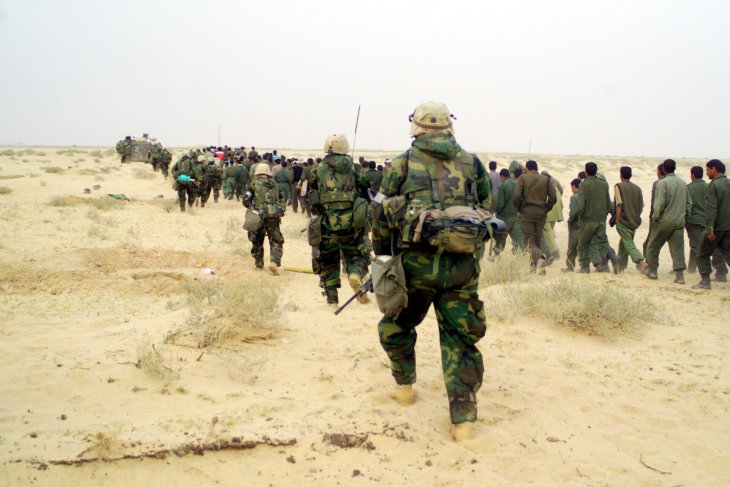Donald Trump has made statements sceptical of military interventions in the Middle East. This is perhaps a rare piece of good news.
Military intervention as a means of building democracy has once again become a hot topic. The Norwegian government has been criticized due to the consequences of the intervention in Libya. Hillary Clinton has been branded a hawk because she is seen as more willing to use military force than Obama. Some supporters of Bernie Sanders seemed to prefer Trump to Clinton, in the hope that Trump would be less interventionist.

Experiences from the interventions in Afghanistan in 2001, Iraq in 2003 and Libya in 2011 have not been positive. What went wrong? Photo: US Marines – Iraq 2003
The logic behind democratic intervention is clear enough: democracies rarely if ever go to war with each other. Stable democracies also experience few civil wars. If a civil war occurs nonetheless in a stable democracy, as a general rule the conflict will be less bloody than in an authoritarian country. Genocide and politicide are also rare in democracies. An increase in the number of stable democracies, the argument runs, will contribute to lower levels of violence in both domestic and external conflicts.
Democratic countries generally emerge victorious from wars. The losing party often experiences regime change, which is more often than not in a democratic direction. Accordingly it may be tempting to use military force to stimulate the growth of democracy in formerly authoritarian states. If one follows this line of thinking, war can lead to democracy – and thus to peace.
World War II can be interpreted as a triumph for such a strategy. The Axis powers were defeated and democratic governments were established in Italy, Japan, and Germany. A more modest, but more recent, example was the Falklands War of 1982 between Argentina and the United Kingdom. Argentina’s conquest of the disputed group of islands, orchestrated by the country’s ruling military junta, was highly popular domestically. When the United Kingdom took the islands back by force, the Argentinians turned against their military rulers. The junta was forced to resign and democracy was eventually restored. Something similar happened in Cyprus in 1974.
At the end of the Cold War, democracy appeared to be the only game in town, and thus it is not surprising that Bill Clinton, George W Bush, and others embraced the idea of a democratic peace. Nor is it surprising that Western politicians thought that the further spread of democracy could be assisted by military means, for example in the Balkans or in the Middle East. The increased emphasis on global human rights in international politics also made it easier for many sceptics to tolerate military intervention.
But experiences from the interventions in Afghanistan in 2001, Iraq in 2003 and Libya in 2011 have not been positive. What went wrong?
Even though these interventions put these countries on a course towards democratic government, they did not create stable democracies. Instead, the result was unstable semi-democracies. Countries in a grey area between stable dictatorship and stable democracy experience more, not fewer, armed conflicts. At least three factors contributed to these failures.
First, in general, the government apparatus of the previous regime was simply scrapped. Establishing new systems, however, was not as easily accomplished. Wealth in Iraq and Libya stemmed largely from oil revenues that were monopolized by the countries’ elites. When these elites disappeared, ethnic groups and warlords competed to secure as much as possible of this wealth for themselves. A national community that can build a strong state is not created in an instant.
Second, Afghanistan, Iraq and Libya are all entirely surrounded by authoritarian states. All other things being equal, war is more likely to break out between a democracy and an authoritarian state than between two authoritarian states. Accordingly, if one manages to establish a new democracy in a region of authoritarian states, the risk of war will generally not go down, but up. There is also a risk of contagion from unrest in neighbouring countries, for example if rebel groups establish safe zones on the other side of the border.
A third factor in the failure of these interventions is that military interventions, especially interventions that are not sanctioned by the United Nations, undermine international law no matter how good the motives. They comprise an open invitation to authoritarian states to follow the same strategy. We see the result of Western countries having gone to such great lengths in Libya in Syria, where Russia has intervened to defend an old authoritarian ally under the banner of combating terrorism.
Neither China nor Russia can be expected to be enthusiastic about democratization, but they share an interest in having stable regimes. Despite their authoritarian characteristics, neither of these countries has returned to its old Stalinist excesses. Cooperation between the superpowers is at the core of efforts to build states with stable forms of government, with a hope that they will gradually become more democratic over the course of time.
Donald Trump has made statements sceptical of military interventions in the Middle East. Despite his inconsistencies and his unpredictability, perhaps we can see this as a rare piece of good news.
- Nils Petter Gleditsch is a researcher at the Peace Research Institute Oslo (PRIO) and is also Professor Emeritus of Political Science at the Norwegian University of Science and Technology (NTNU). His book Mot en mer fredelig verden? [Towards a more peaceful world?] has recently been published by the Norwegian publisher Pax Forlag and was launched at PRIO last week.
- A shorter version of this text was published in Norwegian in the daily Dagens Næringsliv 11 November 2016: ‘Demokratisk intervensjon?‘
- Translation from Norwegian: Fidotext